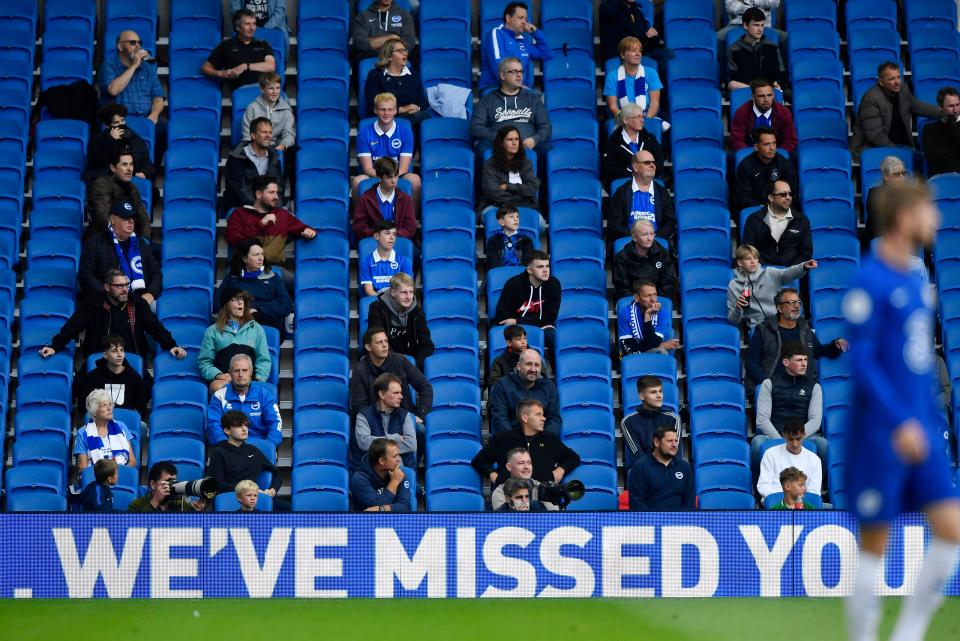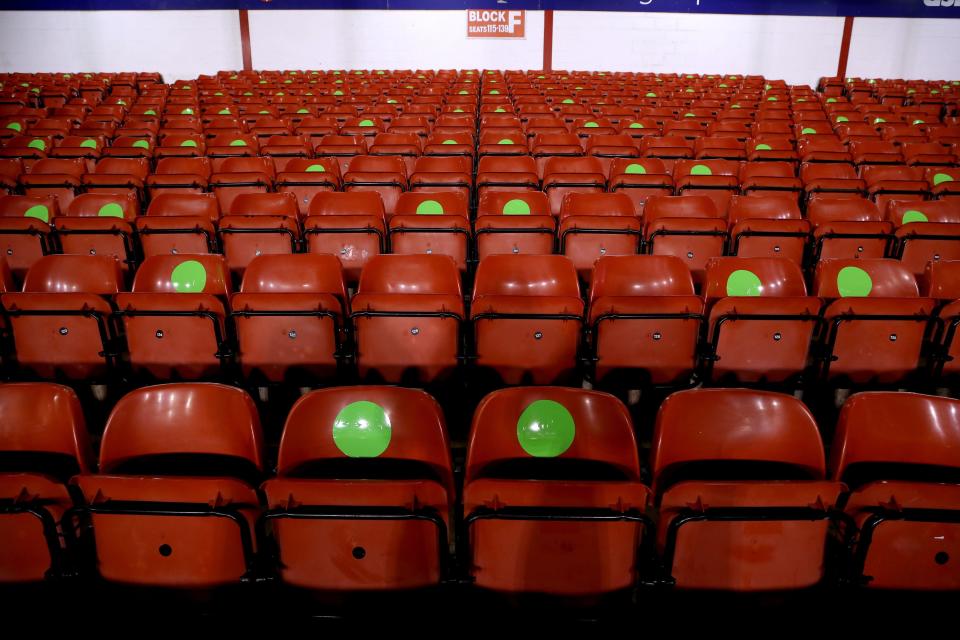‘It’s optics, not facts’: Football pushes back in fight against government to let fans return to matches

If the belief in the government is that it “would not be a good look” to bring fans back into stadiums any time soon, the major complaint within football is that they are not even being heard.
“What is so frustrating is that they completely ignored the results of what were incredibly successful pilots,” a prominent source says. Some involved wonder whether the research was even read, as one anecdote indicates.
The major sporting bodies had a conference call with Oliver Dowden, the Secretary of State for Digital, Culture, Media and Sport (DCMS), two days before September’s cabinet decision that the return of fans would be postponed. At that meeting, Rick Parry, the chairman of the English Football League, said that he understood the government’s major concerns were actually about how supporters get to stadiums. So, he pointed out that 66 per cent of EFL fans travel by car.
The response? “That’s really surprising.”
There was utter bemusement from sporting bodies. “How can it be surprising if they are supposed to be concerned about transport,” one source complained. “It illustrates they hadn’t done basic analysis on how people travel. Only a third travel on public transport, so that solves that, and other relevant arrangements can be made with authorities.”
The feeling within football is that the government's decision is entirely based on “optics” and public relations, as opposed to science and facts.
It is actually an issue that has only grown in importance over the last few days, despite the huge rise in cases that many believe should see plans shelved for the foreseeable future. That is because of the ongoing debate about a bail-out for the lower league clubs, and where money is going to come from, that has only been further amplified by ‘Project Big Picture’.
Dowden is set to be asked about the issue on Wednesday, as he faces questions from MPs on the DCMS committee.
Many within football believe the benefit even goes beyond saving their clubs. They feel that the return of fans can show a way forward for British society, and how people can continue to have some level of normality even amid a high number of cases.
“The whole point is surely trying to find a way to come out of this, or safely living with it, without going into hibernation again,” one involved source says.

Key figures in football also believe this is entirely achievable, and that the plans are sufficiently sophisticated.
This is why they don’t believe it is “tone deaf” to be talking about the return of supporters. The point, they argue, is about the realism of the plans.
Health authorities are understood to have accepted they are safe. The DCMS were meanwhile "greatly impressed" by football’s work, something which made things rather tricky for under-secretary Nigel Huddleston when he suddenly found himself having to defend the government’s U-turn in front of MPs.
The truth is it was hard for the DCMS not to be impressed. The plans are “exceptionally thorough”, and a lot of work has gone into making it all as safe as possible.
There is clear guidance for fans, as well as ample space, and rigorous order as regards when people should arrive - right down to the “sophistication” of queuing systems.
All of the test events went well, and there was no evidence to suggest increases in coronavirus cases from them. The feedback from those who attended was that they felt safer in stadiums than they did at the supermarket.
What’s more, everyone involved is confident that football clubs are more capable than any other industry at handling mass crowd control in circumstances like this. They have the experience from hundreds of thousands of people going to thousands of games across the country for years. Consequently, compliance at test events was encouragingly high.
The plans were so advanced that clubs had started to look into how you apportion tickets to supporters.

The fundamental concern from the game is that all of this was trumped by mere whims from Boris Johnson, Michael Gove and Matt Hancock.
“It wasn’t about how good the plans actually were or anything to do with the plans,” one well-placed source says. “It was about the timing, and how it would have looked bad at a time when the government are trying to say ‘tighten up’.
“It’s optics, not facts.”
A worry repeatedly expressed within the game is that “it’s a legacy of prejudice against football crowds, from people who don’t go to matches”.
“It’s classic fear of a working-class mob,” one source said.
Many bitterly point to Gove’s comments about the sport not being important, and the lack of understanding of its cultural value.
The contrast with the Royal Albert Hall, and how theatreland is treated, is constantly referenced. Some figures have complained of “weird contradictions” in government responses, to go with the concerns about transport. While health officials had accepted stadiums are safe, for example, they were more worried about pubs around the grounds. Instead of temporarily closing those pubs for fixtures, though, the rationale has just been to not let people go at all.
There have similarly been some mixed messages, which are relevant to what happens next.
Although Johnson has spoken about a likely six-month wait, sources are insistent the government has told football the situation will be reassessed every month, and that the Premier League has been asked to prepare four more test events by the end of the year.
Working groups have also been set up to account for the worsening situation, although there is some concern from lower leagues that could lead to “ludicrous high-tech solutions” that only top clubs can afford.
“We want to get clubs in front of ministers,” one leading source explains. “Because, when you hear it, it’s convincing. A lot of it should be about local responsibility, as in Germany, not bland statements from central government. That’s the way it’s happened with the Bundesliga, where it’s regional. If clubs can convince Local Health England, that should be the test. If they can’t, that’s fine. If we have local lockdowns, we respect that.
“But it should be about that nuance.”

The example of Germany is also instructive because it hasn’t been completely smooth there, and has necessitated a lot of adaptation. Bayern Munich recently played behind closed doors again. Cologne had a match that was initially supposed to hold 9,200, then went to none, before being allowed 300 at short notice. The Netherlands is meanwhile locking fans out for six weeks.
Leaving it to regions could also cause other issues, given how fragmented the national situation is. While fans returning in London, say, wouldn’t have been a problem up until recently, it would have gone against regulations in a lot of the north.
Some sources wonder whether that would raise issues of sporting integrity, and unfair advantage. Revenue-sharing may also have to be explored.
Key figures in the game would still insist that a layered and adaptable approach is better than nothing, as well as essential.
“We’re all aware infection rates are rising, and the stats are pretty scary, but that’s the key: responsibility. There is evidence this is all possible.”
In the meantime, most clubs have budgeted to be without fans for six months, others for the whole season.
It’s also worth remembering that the return of fans wouldn’t actually see “new” income, but instead just mean that clubs wouldn’t have to pay back fans for season tickets. Manchester United, for example, are currently reimbursing supporters for every game that doesn’t have crowds. There is also the possibility that the government subsidises matchday revenue for lower-league clubs.
This all remains under discussion. Football’s various parties hope they are actually heard, and it doesn’t just come down to how it looks.
Read more
Rice insists ‘100%’ of players want fans back in stadiums
Government fears ‘Project Big Picture’ is a ‘power grab’
Premier League meeting tests unity of Big Six over Project Big Picture

 Yahoo Sport
Yahoo Sport 





































